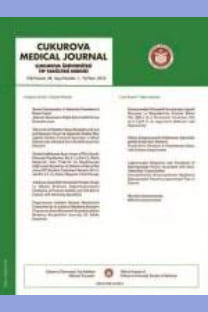Psikiyatri Hastalarının Tedaviye Uyumu
Uyum, Psikotik Bozukluk, Depresyon, Anksiyete Bozukluğu, Bipolar Bozukluk
Adherence to the Treatment in Psychiatric Patients
Adherence, Psychotic disorder, Depression, Bipolar disorder, Anxiety disorder,
___
- Ervatan SÖ, Özel A, Türkçapar H, Atasoy N.
- Depresif hastalarda tedaviye uyum: Doğal izlem çalışması. Klinik Psikiyatri Dergisi. 2003;6:5-11.
- Ateş MA, Algül A. Bipolar bozukluklarda tedavi
- uyumsuzluğu. Türkiye Klinikleri Dahili Tıp Bilimleri Dergisi Psikiyatri. 2006;2:60-4.
- Noble ML. Doctor-patient communication and adherence to treatment. Adherence To Treatment In Medical Conditions. London: Wiley. 1998.
- Lingam R, Scott J. Treatment non-adherence in affective 2002;105:164-72. Psychiatr Scand.
- Altamura AC, Mauri M. Plasma concentrations, information and therapy adherence during long-term treatment with antidepressants. Br J Clin Pharmacol. 1985;20:714–6.
- Çobanoğlu ZSÜ, Aker T, Çobanoğlu N. Şizofreni ve
- diğer psikotik bozukluğu olan hastalarda tedaviye uyum sorunları. Düşünen Adam. 2003;16:211-8.
- Aker T, Üstünsoy S, Kuğu N, Yazıcı A. Psikotik
- bozukluğu olan hastalarda tedaviye uyum ve ilaç tedavisine uyumsuzluğu değerlendirme ölçeği. 36. Ulusal Psikiyatri Kongresi Özet Kitabı. Antalya: 2000.
- Perkins DO. Predictors of noncompliance in patients with schizophrenia. J Clin Psychiatry. 2002;63:1121- 8.
- Lacro JP, Dunn LB, Dolder CR, Leckband SG, Jeste DV. Prevalence of and risk factors for medication nonadherence in patients with schizophrenia: a comprehensive review of recent literature. J Clin Psychiatry. 2002;63:892-909.
- Aker T, Çıtak S, Ceyhanlı A, Sarılgan C, Taştan U, Ögel K ve ark. Hasta yakınlarının ilaç tedavisine karşı tutumu, 30. Ulusal Psikiyatri Kongresi, Poster Bildirisi, 1994.
- Mitchell AJ, Selmes T. Why don’t patients take their medicine? Reasons and solutions in psychiatry. Adv Psychiatr Treat. 2007;13:336–46.
- Mitchell AJ, Selmes T. Why don’t patients attend their appoinments? Maintaning engagement with psychiatric 2007;13,423–34. Psychiatr Treat.
- Young AS, Grusky O, Jordan D, Belin TR. Routine outcome monitoring in a public mental health system: The ımpact of patients who leave care. Psychiatr Serv. 2000;51:85-91.
- Percudani M, Belloni G, Contini A, Barbui C. Monitoring community psychiatric services in Italy: differences between patients who leave care and those who stay in treatment. Br J Psychiatry. 2002; 180:254-9.
- Nelson EA, Maruish ME, Axler JL. Effects of discharge planning and compliance with outpatient appointments on readmission rates. Psychiatr Serv. 2000;51:885-9.
- Killaspy H, Banerjee S, King M, Lloyd M. Prospective controlled study of psychiatric out-patient non-attendance. Characteristics and outcome. Br J Psychiatry. 2000;176:160-5.
- Patel NC, Crismon ML, Miller AL, Johnsrud MT. Drug adherence: effects of decreased visit frequency on Pharmacotherapy 2005;25:1242-7. clozapine therapy.
- Gonzalez J, Williams JW Jr, Noël PH, Lee S. Adherence to mental health treatment in a primary care clinic. J Am Board Fam Pract. 2005;18:87-96.
- Nosé M, Barbui C, Tansella M. How often do patients with psychosis fail to adhere to treatment programmes? A systematic review. Psychol Med. 2003;331149-60.
- Ateş MA, Algül A. Bipolar bozukluklarda tedavi uyumsuzluğu. Türkiye Klinikleri Dahili Tıp Bilimleri Dergisi Psikiyatri 2006;2:60-4.
- Manschreck TC, Boshes schizophrenia trial: results, impact, controversy. Harv Rev Psychiatry. 2007;15:245-58. The CATIE
- ISSN: 2602-3032
- Yayın Aralığı: Yılda 4 Sayı
- Başlangıç: 1976
- Yayıncı: Çukurova Üniversitesi Tıp Fakültesi
Term Gebelikte Spontan Over Hiperstimülasyon Sendromu
Aytekin TOKMAK, Ali GÜZEL, Kadir KANGAL, Ahmet YALINKAYA
Buket KILIÇASLAN, Aytül NOYAN, Nurcan CENGİZ, Çağla SARITÜRK, Gönül PARMAKSIZ, Esra BASKIN
Obsesif Kompulsif Bozukluk Tanılı Hastaların Cinsiyet Farklılığı Açısından Değerlendirilmesi
Ebru ALTINTAŞ, Gamze ÖZÇÜRÜMEZ
Kraniyal Kemik İliği Metastazlarında Difüzyon Ağırlıklı MR Görüntüleme
Özlem ALKAN, Burçak PEKÖZ, Naime ALTINKAYA
Metamizol Sodyum Kullanımına Bağlı Agranülositoz
Eren ÇAĞAN, Havva ÇAĞAN, Duygu SÜRMELİHİNDİ
Akut Karın ile Gelen Guillain-Barre Sendromu
Faruk İNCECİK, Özden HOROZ, M. Özlem HERGÜNER, Dinçer YILDIZDAŞ
Anti-Tümör Nekroz Faktör Alfa Tedavisi ve Tüberkülin Cilt Testi
Emine Duygu BOZKIRLI, Müge TUFAN, Lale ÖZIŞIK, Nazan ŞEN, Ahmet YÜCEL
Doğumsal Böbrek ve İdrar Yolları Anomalilerinde MicroRNA Gen Polimorfizmleri
Özlem TEZOL, Ali DELİBAŞ, Özlem AY, Ümit KARAKAŞ, Bahar TAŞDELEN, Mehmet ERDAL
ACE İnhibitörüne Bağlı Öksürük Senkopu
Ayşe KOÇ, Mehmet PEKÖZ, Hacer BOZDEMİR
Obez Kadınlarda Metabolik Sendrom ve Öfke Arasındaki İlişkisinin Belirlenmesi
Hamit KETEN, Olcay GÜRARSLAN, Salih GENÇOĞLAN, Hakan ÖNAY, Oğuz IŞIK
